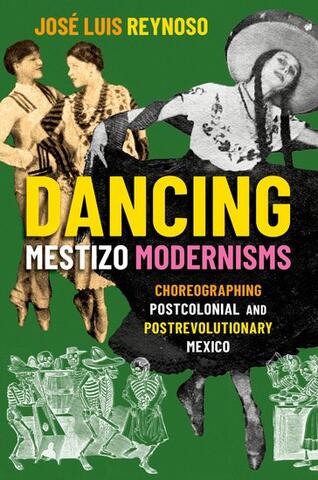The Dance Studies Association has awarded José Luis Reynoso, assistant professor in the Department of Dance, the 2024 Oscar G. Brockett Book Prize for Dance Research for his book, “Dancing Mestizo Modernisms: Choreographing Postcolonial and Postrevolutionary Mexico” (Oxford University Press, 2023).
The award recognizes the best scholarly work in dance published in the past three calendar years. The DSA adjudicates the award, while the Oscar G. Brockett Center for Theatre History and Criticism at the University of Texas at Austin provides the monetary prize of $1,000. According to its website, the Center created the award to honor Brockett, an acclaimed theatre historian, by highlighting the finest scholarship in theatre, dance, and performance
Reynoso’s award-winning book examines how dancers shaped Mexico’s cultural politics and national identity across different historical periods. It highlights how dancers both resisted and reinforced colonial-era racial and social hierarchies and introduces the concepts of “embodied mestizo modernisms,” blending indigenous folkloric, ballet, and modern dance, and “transnational nationalisms,” which show how national identity is influenced by both local and international influences.
Reynoso earned a master’s degree in psychology from Cal State Los Angeles. He holds a doctorate in culture and performance with a concentration in dance studies and an M.F.A. in dance from UCLA. He was also an Andrew Mellon postdoctoral fellow in dance studies at Northwestern University.
According to the DSA, “Exploring how choreographers, dances, and every day moving bodies created cultural meaning in postcolonial and postrevolutionary Mexico, José Luis Reynoso’s Dancing Mestizo Modernisms is a timely and urgent contribution to remapping modernist dance from a planetary perspective. Backed-up in solid archival work, it deploys its main conceptual term – mestizo modernism – with clarity and acuteness. Reynoso shows how distinctive dance practices, intercultural collaborations, and specific choreographic works gave rise to embodied mestizo modernisms that combined indigenous, folkloric, ballet, and modern dance elements to reflect and co-constitute Mexico’s formation as a nation. Arguing for the complex entanglements of transnational nationalisms in this process, the book is careful not to lose sight of the internal tensions and contradictions in danced mestizo modernisms, tracing their ambivalent status between neo/colonial legacies, colonizing forces, and decolonial potentials.”
Reynoso is currently working on his second book, “Mythologies and Other Narratives of World and Self-Making,” and a series of creative projects titled “The Migrant’s Time.”
